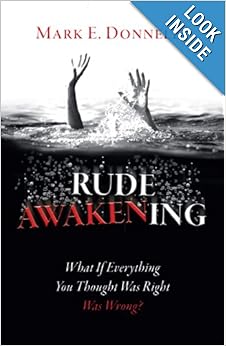
Rude Awakening by Mark Donnelly
The phrase ‘rude awakening’ often refers to a situation a
person faces in which they are unprepared for or were not ready for in the
least bit. Mark E. Donnelly’s new book
entitled Rude Awakening is a jolt to the bones of those believers coming to
church every week and believing on their own merit. Donnelly goes onto ask a series of
introspective questions regarding our relationship with God in writing, “What
is the fruit of truly knowing God?....Are you a good Christian? By whose definition? Are you defining your goodness merely by what
you abstain from” (14-15)? Mark supposes
that there is a kind of knowledge about God that doesn’t equate to truly
knowing him because there is a disconnect between our actions and our
heart. Rather, being united to Christ
gives us the motivation to love people well and serve them. Mark goes onto to
mention that the love is in three directions: upward, outward, and inward (17).
After a near death swimming drowning, Mark goes onto to talk
about various subjects in the book from the Holy Spirit to love and hate. One of the best insights in the book was Mark’s
taking a time inventory of his life by taking a time budget. After calculating the time he spent on
various activities, he asks a pointed question, “What activities are wasting my
time? What activities can I not
eliminate” (106)? I think we forget how
often time gets away from us if we are not consciously setting wise
boundaries. This wise use of time
includes the use of our money which is often a good marker of our hearts. I think Mark has a good way of getting to the
bottom of issues and pointing out practical ways Christians can come to terms
with their failures and sins.
I didn’t agree with every point of Mark’s theological views
but I appreciated his willingness to see that even issues such as time and
money have a dramatic effect on our spiritual lives.
Thanks to Book Crash for the review copy of Rude Awakening
in exchange for review.
Comments
Post a Comment